Tsjuder played the most recent edition of Graveland festival and were nice and high on the bill. A rightful place knowing that the band has been around for three decades. Just before the show, I meet the band backstage, where they inform me they want to do the interview right after the show. And they mean that quite literally, as I am asked to report back fifteen minutes after the show. When I do so, the band members are washing the paint off of their faces while welcoming me and offering me a drink. When most of the paint has been washed off, we sit in the back of the tent, where the rain is literally forming large puddles. We are under the impression that it’s a safe place to shelter from the rain, until we get up after the interview and someone carelessly fishes a loose plug out of the water: water we had our feet in only moments before. Fortunately, there were no accidents and we came away unscathed. The live photos were taken by The View Photography.
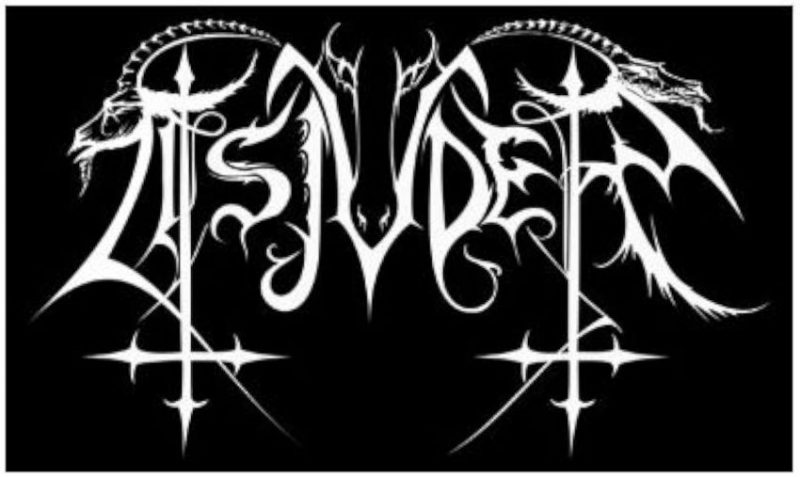
Good evening. I just saw you perform and I absolutely loved the show. How do you look back on it? Satisfied, or just another one from the list?
Nag: Thanks. It was a good show. The stage was very wet due to the rain, so we had to
move our equipment a bit more to the back. Other than that, everything went great!
Draugluin: Even more so considering we didn’t sleep much last night. We probably look a bit pale, which is not entirely due to the paint, haha.
Your last release has been out nearly a year already. How do you look back on it now some time has passed? Are you still content or are there minor things that could’ve been different in hindsight?
Draugluin: I rarely listen to our work once it’s finished and I haven’t listened to the album yet. So I think I’m content.
Nag: I actually listen to the album a lot. I’m still satisfied with it.
Draugluin: You know, once we finish mastering, the process is over for me and I don’t look back. Not even what’s being said about the album. I just don’t look back. It also took a very long time for the album to come out. The recordings had been finished for a year and a half when the album came out. Reasons for that were, of course, COVID, some problems in pressing and figuring out the artwork. All that together caused quite a delay.
Speaking of delays: there’s an eight year gap between Helvegr and Antiliv…
Draugluin: There are many reasons for that. We parted ways with our drummer AntiChristian, for one. After Antiliv we recorded new music, but it didn’t work and nothing was right. When writing Antiliv, we did so in our rehearsal room. We tried that again, but we didn’t succeed. We figured out along the way that the ideas that Nag and I had were different than AntiChristian’s. Mostly musical differences, that is.
Nag adds: AntiChristian wanted more of a rock’n’roll style. Nothing wrong with that in itself, but we wanted to record another black metal album.
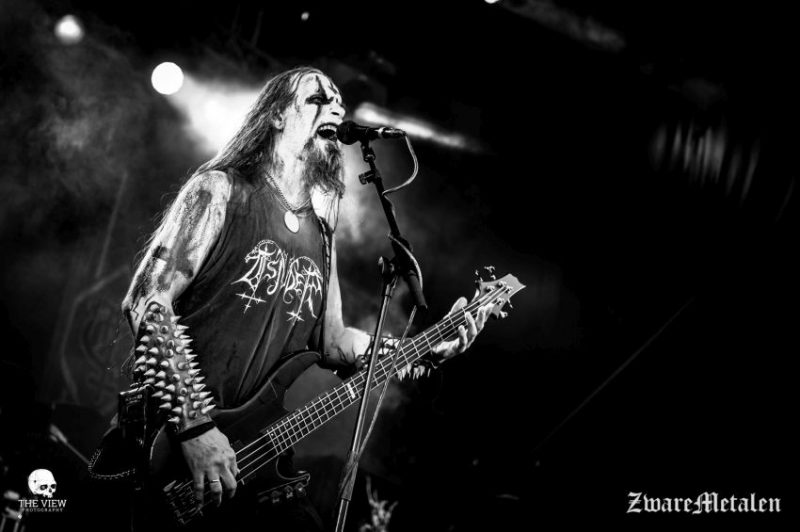
What is the writing process usually like in Tsjuder?
Draugluin: This differs per album. But as Nag mentioned, Antiliv was a band process in which we all contributed riffs. These were then poured into songs in our rehearsal room. This was different for Helvegr: we kind of failed when working out the songs. Eventually we were able to write it all, but it was a long and difficult process. Perhaps that’s the reason that I no longer listen to the album.
When exactly in the process do you know if it’s a good riff?
Draugluin: I just know and it also helps if Nag thinks it’;s a good rif. Then you know you’re going in the right direction.
Nag: For me, it has much more to do with feeling. And besides that, you have to keep the whole picture in mind. By that I mean that of course a riff should feel good right away. With a good riff I always have an idea about what the drums should sound like and if there will be vocals on it and where. Sometimes we have two good riffs that we can play one after the other, but if there is no good one after that, we end up throwing them all away. We really had a lot of riffs that were extremely good but we threw them away because they didn’t fit anything.
Draugluin: The composing on Helvegr was also different because we were looking for riffs that form a theme when played one riff after another. When listening to Gods Of Black Blood, for example, you can hear that there’s some kind of theme in our music which flows through all riffs and connects them with each other.
So composing always starts off with a riff and not vocals or an idea for lyrics?
Nag: We’ve tried everything already. On our first few albums we mostly started off with lyrics. But more recently, and Helvegr in particular, we mostly started off with the music. Composing in a rehearsal room is different in comparison to composing at home, because you also have other musicians around. A drummer, for example. Because you get feedback from other band members who play their parts, it’s possible that something changes in the riff. When composing Antiliv and Demonic Supremacy the drums played an important part.
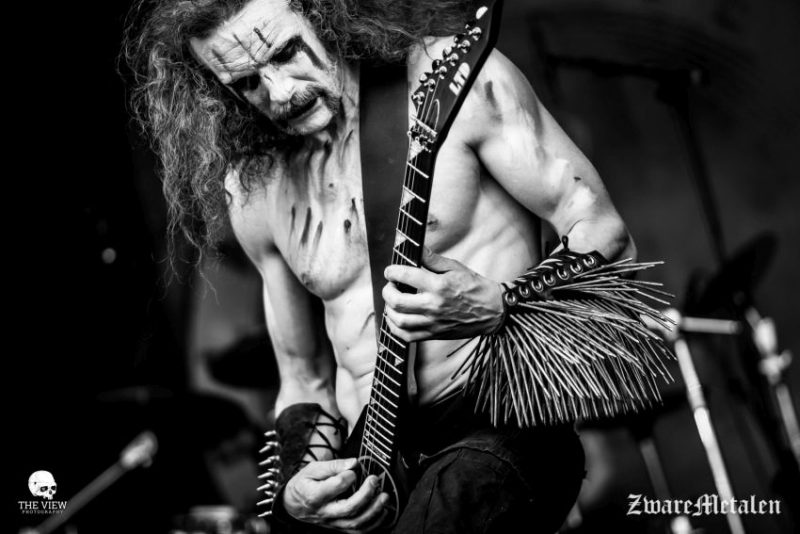
Through the years, the composing of songs has thus changed. It seems to me that this allows you to keep a fresh perspective?
Nag: I think we are super conservative. We still listen to the same music. What I mean is: the albums that inspired us in the early years, continue to inspire us. We are not influenced by newer albums. We are not very strict, but if we come across a riff while composing which is a bit too death or thrash metal and doesn’t fit Tsjuder, we will not use it. And of course, our lyrics have also changed because we have grown older and changed as people throughout the years. Your personal horizons will naturally broaden a bit as you get older and you can hear that in the lyrics. But of course there will always be a recurring theme in our music and lyrics. So not that much has changed over the years. I understand your question though, because in the early years our texts were more straight-to-the-point. Very anti-religious you know, now it’s a bit different but still the same.
Drauglin clarifies: There have always been several people involved in writing lyrics. On Kill For Satan, it was our second guitarist, Arak Draconiiz. He was very good at writing lyrics. He wrote several lyrics for that album that were very good!
Your lyrics are very anti-christian. Do you still find this relevant?
Draugluin: There have been several people who have written the lyrics in Tsjuder. For me
personally, my lyrics are always anti-religious but not necessarily directed against Christianity. I am not Christian nor do I have anything against it. Some of my lyrics are about ancient Norway, its mythology and culture. I have a lot of interest in that. For example, a subject like murder or insanity is closer to me than Christianity. AntiChristian was much closer to Christianity…
Nag adds: He grew up in a strongly religious family. He really hated Christianity and for him, the lyrics really were a statement. I do agree with Draugluin. Church and state are still not separated in Norway. And I am absolutely against it. I have de-registered from church so many times, but apparently there are loopholes in the system because I get re-registered every time. I’m hoping I’m currently not a member of church, but there’s no way of knowing. My wife and I should officially no longer be a member of church, but our children received a letter which stated that they are automatically made a member of church. I despise the way Christianity is shoved down your throat in Norway. Aside from that, I personally have a strong hate against all forms of religion. In general, I don’t really care what other people do and Christians are just sheep following the masses. They can screw up their lives all they want, I don’t give a rat’s ass, but I think it’s ridiculous! And it also infuriates that we need to take religion into account so much in the society we live in. When writing lyrics, I do not purposely sit behind a desk but inspiration just hits me. For example during nighttime when driving home, but it has also occurred while watching a cartoon such as Ren and Stimpy and Ren just says something on which I completely
agree, that triggers something inside of me. So I never know when I will be inspired to write some lyrics.
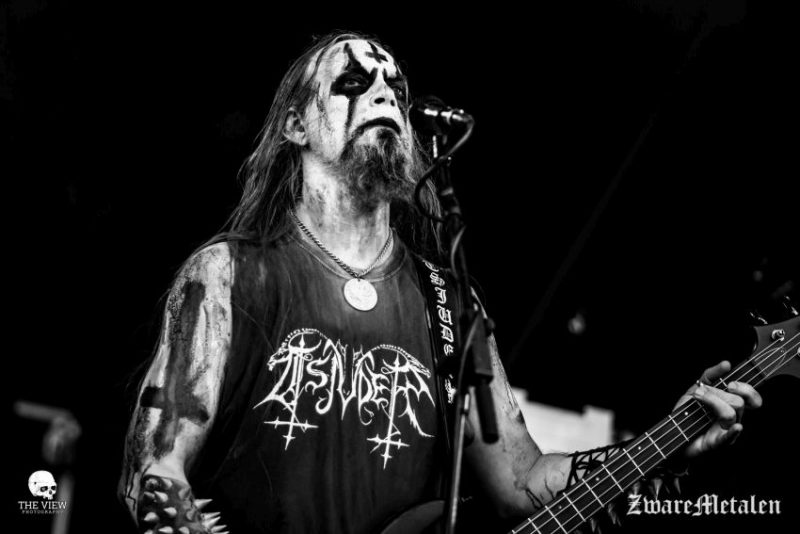
Tsjuder began in 1993. Are you happy with your place in the scene right now?
Nag: What scene? (Draugluin bursts into laughter) I’m not sure you can speak of a scene. I define my scene as a small circle of friends. I don’t care much for the rest.
Draugluin, serious again: We have become much more stoic in that regard. In the early 1990s, black metal was much more than music. There were many bands that used black metal as an image. They walked around with make-up and spikes, but didn’t like the music because it was far too extreme for them. That bothered me a lot at the time. Many of those guys suddenly became very big and so did the bands they played in. Meanwhile, we have been around for a long time, still play live and still release cd’s. So we are doing something right.
In the early days, black metal was still really underground and now you’re at a fairly big festival and it seems to have become more mainstream. Do you dwell on that?
Nag: We really love playing smaller venues with small stages. We are currently playing a lot in America, mostly in small venues without security and fences in front of the stage. This makes that we are fairly close to the audience and we really enjoy it. When you play a bigger stage (like today), it almost seems like a whole new world. On the one hand, it’s really cool to play a large stage in front of many people, but on the other hand it’s harder to connect with the audience.
Imagine you’d have to choose: never playing a festival again or never playing venues again.What would it be?
Draugluin and Nag both remain silent… Eventually Druagluin says: Playing a festival like today is really cool.
Nag: I don’t think I can choose. Both have their charm and downsides, we like the best of both worlds. Haha.
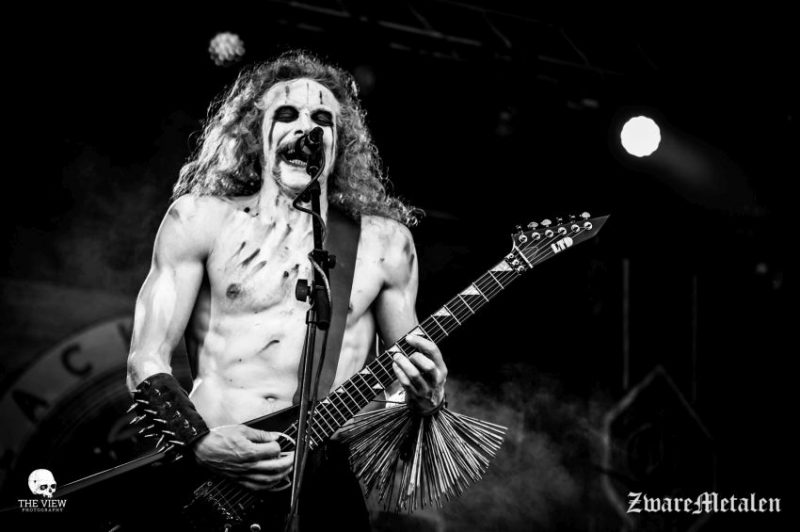
Do people in America react differently to you and your music?
Nag: Everything is different in America, and South-America even more so. People over there are naturally more aggressive, which fits black metal very well. I always just love being there. We also have fun in Europe, don’t get us wrong! Each country has its own character and audience. This leads to different reactions each time. We’ve also played festivals where we were the outcasts and we didn’t fit in. The audience was too different from our music and what we stand for. I won’t be telling any names, though. But we have fun most of the time!
Draugluin: I don’t see it like that at all! It’s okay to play at a festival most of the time, but
sometimes we really are the odd man out. When we play a bigger festival where there are a lot of people, but no one’s there to see a black metal band, then it’s obvious that we do not belong there.
Nag: You are correct. I can give an example: Roskilde. It was amazing playing it but only 10% of the people actually knew us and the other 90% were just curious. It simply isn’t a festival for us, but eventually we played it.
Do you have time to go sightseeing in the country that you are playing?
Draugluin: We would love to (especially South-America) but when on tour, there often isn’t much time left. We often arrive in the country early in the morning, go to get some sleep at the hotel, do a soundcheck, have some food and play the show. After that, you need to get back to the airport to catch the next plane. We sometimes have the day off and we can go have a look around. That’s always really cool!
Nag: So the answer is yes! We love to go and see the country. Unfortunately, we can’t today. We arrived in the Netherlands today and have to leave again tomorrow. But we have already seen Amsterdam a couple of times, haha.
I’m all out of questions. Thank you for your time and honest answers. Any last words?
Nag: First of all, we’d like to thank you for the interview and that you’ve waited for us to do the interview. We’d also like to thank everyone that came out to watch us, despite of the
downpour. We really appreciate it! Thanks for supporting Tsjuder and black metal!
Links:













